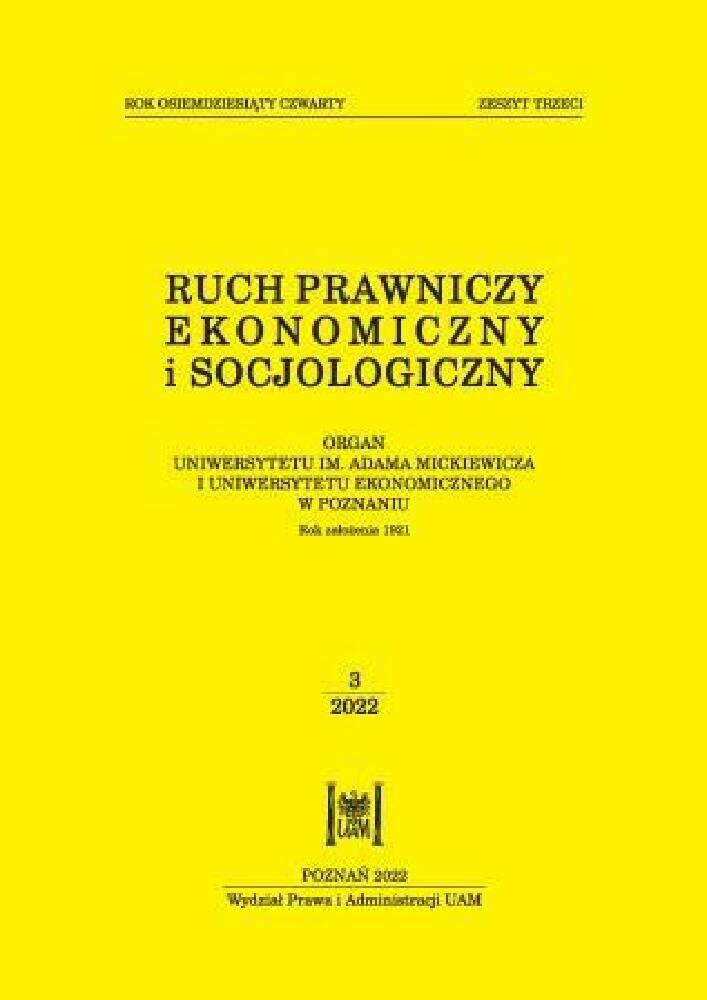Abstract
The aim of this paper is to analyse the judgment of Federal Constitutional Court (FCC) in Germany, issued in March 2021. Both the seminal character of this judgment as well as its influence on the jurisprudence of the other European courts in climate-related cases encouraged the author to conduct this research. The FCC stated that achieving climate neutrality has become a new constitutional duty of the public authorities. In this context, the research hypothesis is that the latest judgment confirms the ongoing process of the greening of human rights in the constitutional legal order in Germany. At the same time, new human rights and liberties connected with climate neutrality may arise. This paper will contribute to the discussion on the current challenges related to the implementation of the European Green Deal, which the FCC as well as the judiciary of other European countries must face. The role and the meaning of climate neutrality as a new, constitutional value are analysed. The article mostly applies the legal-dogmatic methodology. The final conclusions are as follows. In the latest climate-related jurisprudence, the FCC concentrates mostly on the constitutionality of the goals of the regulation, and on the means used to achieve climate neutrality in a timely manner. However, in the next years the scope of the accountability of the government could be significantly broader. It cannot be ruled out that after 2030 the FCC will be obliged to assess not only the compliance of the goals of the regulations with the constitution, but also the efficiency of the adopted solutions. According to the author, until that time the judicial, progressive interpretation of Basic Law will confirm the increasing role of climate neutrality as a new, constitutional value.
References
Adamczak-Retecka, M. (2010). Odpowiedzialność odszkodowawcza jednostek za naruszenie prawa wspólnotowego. Warszawa.
Albrecht, J. (2020). Das Klimaschutzgesetz des Bundes – Hintergrund, Regelungsstruktur und wesentliche Inhalte. Natur und Recht 42: 370–378.
Alexy, R. (2010). Teoria praw podstawowych. Tłum. B. Kwiatkowska, J. Zajadło. Warszawa.
Aust, H.P. (2021). Klimaschutz aus Karlsruhe: Was verlangt der Beschluss vom Gesetzgeber? Verfassugsblog 2021/5/05. <https://verfassungsblog.de/klimaschutz-aus-karlsruhe-was-verlangt-das-urteil-vom-gesetzgeber/>.
Banaszek, H. (2022). Fit for 55 – rewizja unijnego systemu handlu uprawnieniami do emisji (EU ETS) w ramach Europejskiego Zielonego Ładu. Europejski Przegląd Sądowy 2: 23–28.
Boyle, A. (2009). Environment and human rights, [w:] R. Wolfrum (ed.), Max Planck Encyclopedia of Public International Law. Oxford: 450–451.
Bukowska, J. (2021). Ramy prawne osiągania neutralności klimatycznej w Europejskim prawie o klimacie, [w:] C. Mik, A. Borek (red.), Zmiany klimatu w świetle prawa Unii Europejskiej i prawa polskiego na tle porównawczym. Warszawa: 51–69.
Cabaj, O., Łachacz, O. (2010). „Demokracja środowiskowa” w wybranych państwach Europy Środkowej i Wschodniej na przykładzie implementacji postanowień Konwencji z Aarhus. Polski Rocznik Praw Człowieka i Prawa Humanitarnego 1: 23–41.
Ekardt, F. (2021). Climate Revolution with Weaknesses. Verffassugsblog 8.05.2021. <https://verfassungsblog.de/climate-revolution-with-weaknesses/>.
Hałub-Kowalczyk, O. (2021). Ochrona przyszłych pokoleń w procesie dążenia do neutralności klimatycznej w orzecznictwie Federalnego Trybunału Konstytucyjnego w Niemczech. Przegląd Prawa Konstytucyjnego 5(63): 271–280.
Heselhaus, S. (2012). Verfassungsrechtliche Grundlagen des Umweltschutzes, [w:] K. Hansmann, D. Sellner (Hrsg.), Grundzüge des Umweltrechts. Berlin: 3–63.
Jarras, H. (2020). Kommentar zum Art. 2 UZ, [w:] H. Jarras, B. Pieroth, Grundgesetz für die Bundesrepublik Deutschland. Kommentar. München: 65–117.
Kahl, W. (2022). Ochrona klimatu a Konstytucja – historyczne postanowienie federalnego Trybunału Konstytucyjnego z 21 marca 2021 roku. Ruch Prawniczy, Ekonomiczny i Socjologiczny 84(2): 5–26.
Kleiber, M. (2014). Der grundrechtliche Schutz künftiger Generationen. Tübingen.
Kuźniar, D. (2021). Prawo do zdrowego środowiska jako konstytucyjnie gwarantowane prawo jednostki. Przegląd Prawa Konstytucyjnego 3(61): 201–216.
Leisner, W. (2018). Kommentar zum Art. 20a, [w:] H. Sodan (Hrsg.), Grundgesetz. München: 265–280.
Łazor, M. (2021). Kilka uwag o wykładni celowościowej w prawie ochrony środowiska. Ruch Prawniczy, Ekonomiczny i Socjologiczny 83(4): 31–48.
Mik, C. (2021). Związanie Unii Europejskiej prawem międzynarodowym zmiany klimatycznej, [w:] C. Mik, A. Borek (red.), Zmiany klimatu w świetle prawa Unii Europejskiej i prawa polskiego na tle porównawczym. Warszawa: 17–46.
Sands, P. (1994). The ‘greening’ of international law: emerging principles and rules. Indiana Journal of Global Legal Studies 1(2): 293–324.
Śledzińska-Simon, A. (2022). The End of the German Legal Culture? Verfassugnsblog 26.01.2022. <https://verfassungsblog.de/the-end-of-the-german-legal-culture/>.
Wiese, F., Thema, J., Cordroch, L. (2022). Strategies for climate neutrality: lessons from a meta-analysis of German energy scenarios. Renewable and Sustainable Energy Transition 2: 1–14.
Wolf, J. (2002). Umweltrecht. München.
Wolff, H. (2016). Kommentar zum Art. 20a, [w:] D. Hömig, H. Wolff (Hrsg.), Grundgesetz für die Bundesrepublik Deutschland. Handkommentar. Baden-Baden: 270–299.
License
Copyright (c) 2022 WPiA UAM

This work is licensed under a Creative Commons Attribution-NonCommercial-NoDerivatives 4.0 International License.





